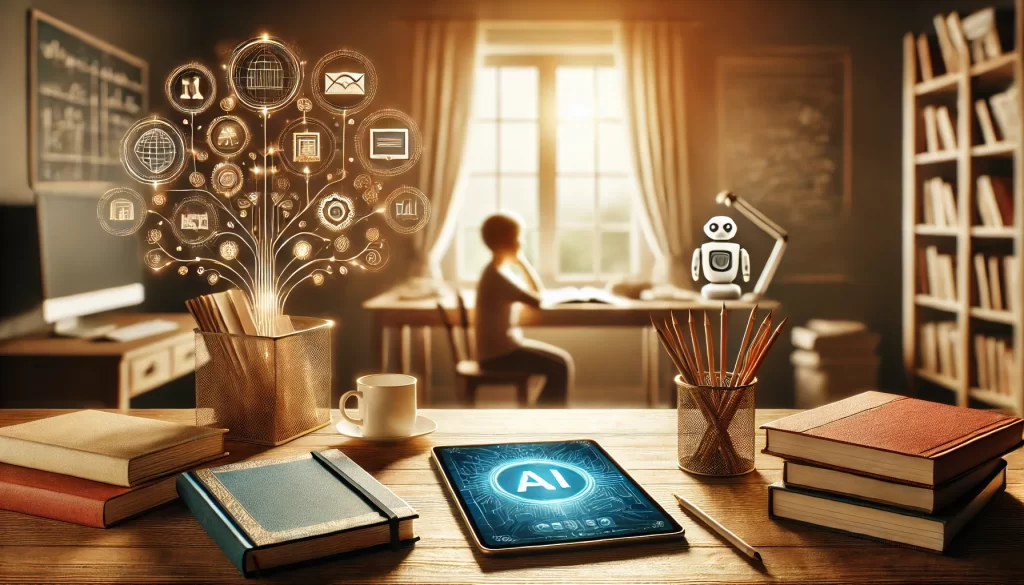
Oh, AI…where to start?
As a homeschooling dad, I know firsthand the thought and care that goes into crafting a meaningful education for our kids. With AI technologies like chatGPT growing in prominence, there’s no shortage of exciting tools on the horizon—but I also deeply understand the caution many of us feel about using new technologies, especially when our convictions and values come into play.
AI isn’t just another educational tool; it’s powerful and complex, and it can feel a bit unsettling when it touches something as personal as our children’s education. And let’s not mention all the ethical and moral implications that need to be considered…
For many homeschooling families, especially those with strong Christian convictions about traditional learning or a faith-centered approach, AI can bring up concerns around privacy, over-reliance on screens, or even a risk of ideological influence. So, before we explore the ways AI can support homeschooling, let’s break down what AI really is—and what it isn’t.
What AI Is—and What It Is Not
AI can seem mysterious, but at its core, it’s a set of algorithms designed to recognize patterns and make data-driven decisions. In homeschooling, AI might help organize schedules, find resources, and even adapt lesson pacing based on a student’s needs. Think of it as an advanced assistant that handles repetitive tasks and makes data-driven recommendations.
However, it’s equally important to remember what AI is not. It’s not a replacement for a parent’s role, nor does it have human judgment or values. AI lacks empathy and genuine understanding. So when we discuss AI in homeschooling, we need to view it as a tool that potentially supports, not replaces, the human side of learning. It can enhance our teaching but can’t replicate the personal, values-driven approach we bring to our children’s education.
It’s easy to start attributing human qualities to AI, especially since it can respond in human-like language. Seeing sentences that mimic our own tone and vocabulary often causes us to think of AI as possessing thoughts, feelings, or judgments, and sentience In reality, though, AI lacks consciousness and self-awareness. AI doesn’t “know” anything in the way that we do; it simply processes vast amounts of data, identifies patterns, and generates responses based on probabilities rather than genuine understanding.
Under the hood, an AI model like ChatGPT analyzes language inputs and predicts the next word in a sentence based on patterns it has learned. It doesn’t comprehend meaning or context as a person would but instead relies on statistical associations. AI is excellent at mimicking language, but it doesn’t have experiences, values, or emotions. So when we discuss AI in homeschooling, it’s crucial to view it as a tool that supports but doesn’t replace the human connection, empathy, and personal insight that only a parent or educator can provide.
Benefits of AI in Homeschooling
There are a lot of uses for AI tools, but I want to outline a few that I think most support a homeschool parent’s goal!
For Parents, Educators and Lesson Planning
- Efficient Planning and Organization: AI can serve as an advanced planning assistant, consolidating calendars, search tools, and reminders to streamline lesson planning. For instance, I used ChatGPT to conduct keyword research for this article, a task that would have been time-intensive if done manually. This efficiency frees up more time for teaching, or in my case, writing.
- Enhanced Customization: With AI tools, you can tailor each child’s learning experience more effectively. AI can analyze student progress and adjust activities based on their strengths and weaknesses in real-time, almost like having an extra set of hands noticing when your child might benefit from a different approach. Of course, to do this, you’d have to “train” your AI model on data for your child, but if we ignore the risks and privacy concern, you can see how it would be helpful!
- Idea Generation for Activities: AI can also help generate new ideas for activities and lessons. Whether you’re looking for hands-on experiments, art projects, or unique ways to introduce historical events, AI can suggest creative ideas you might not have thought of otherwise. It’s like having an idea partner that adds variety and inspiration to your lessons. Let’s be real…I KNOW you already get on google and search for lesson activities. An AI tool can consolidate that practice into one experience, saving you some time.
For Students
- Like a Calculator for Learning Support: AI can provide assistance much like a calculator does, without replacing the need to learn the fundamentals. For instance, an AI tool can give students hints or strategies on math problems, helping them along without doing the work for them. Eventually, as they become proficient in a domain, AI can become the functional equivalent of a calculator. We all know how to do basic math…but we prefer using our calculators for speed and accuracy.
- Interactive Learning Experiences: AI can create engaging, immersive experiences for complex topics, like science or history. Imagine virtual simulations where students can “visit” historical sites or experiment with scientific concepts. These experiences can deepen understanding through active engagement.
- Self-Paced Learning: AI programs can adapt to each child’s learning pace, helping students feel neither rushed nor held back. By adjusting the difficulty or speed of lessons, AI can help students master topics at a comfortable pace, boosting confidence as they learn.
And as a side note, I’m in the process of developing a Christian Homeschooling AI resource specifically tailored for homeschool families! If you’re interested in learning more, sign up using the form here to stay updated. I’ll notify you as soon as it’s ready.
Dangers of AI in Homeschooling and How to Address Them
Ok, you may not be convinced of the benefits because you are VERY aware of the dangers. Let’s talk about those, because the risks are many. Thankfully, there are solutions to these problems, but at the very least let’s cover three big ones:
- Over-Reliance on Technology: One risk of AI in education is that it could lead to dependence, weakening students’ critical thinking and problem-solving abilities. To avoid this, use AI as a supplementary tool. Balancing AI with hands-on learning methods can help build a solid foundation of essential skills. Focus on building foundational skills before introducing AI.
- Privacy Concerns: AI-powered platforms often collect data to personalize learning, which can raise privacy concerns. When selecting an AI tool, look for those that prioritize data security and comply with privacy laws. Checking privacy policies and choosing platforms with transparent practices helps protect your family’s information. Don’t share data you wouldn’t be OK having online. There are AI models developed to protect privacy, in fact, we are working on something like this (see form above).
- Bias and Content Limitations: This is probably my BIGGEST issue. AI systems rely on data from various sources, which can often introduce unintended bias or lack diverse perspectives. To ensure a balanced education, supplement AI-driven content with resources from a variety of perspectives, fostering open discussions and critical thinking. Don’t trust AI for judgements and opinions, and most of all, don’t trust generally trained models for theology. They source their information broadly and likely to give you answers that don’t fit your specific theological leaning.
So What’s Next?
AI offers many possibilities for enhancing the homeschooling experience, from streamlined lesson planning to personalized, engaging learning. Yet it’s important to remember that AI is just a tool, not a replacement for the personal, values-driven education that makes homeschooling so impactful.
With thoughtful use, AI can support our goals and allow us to focus on what matters most in our children’s learning journeys.
And if you’re interested in a tool specifically designed for Christian homeschool families, feel free to sign up on the form above to stay updated on the resource I’m developing.
By combining AI’s potential with our shared values, we can make the most of what technology offers without losing sight of what’s truly meaningful.
